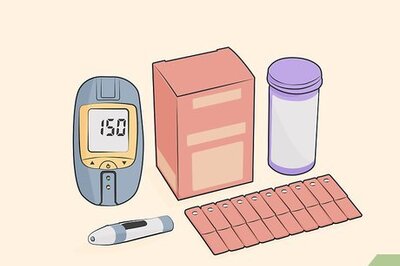
views
Actress Priyanka Chopra recently revealed that she froze her eggs in her early 30s. She welcomed a baby girl via surrogacy in January 2022. For those unversed, egg freezing, also known as oocyte cryopreservation, is a relatively new technology that has gained popularity in recent years as a way for women to preserve their fertility. This process involves extracting a woman’s eggs and freezing them until she is ready to use them to attempt pregnancy. Let’s take a look at the reasons why women choose to freeze their eggs, the process of egg freezing, and the success rates of using frozen eggs for pregnancy.
- What is Egg freezingEgg freezing, or mature oocyte cryopreservation, is a technique utilized to maintain a woman’s fertility potential or her ability to get pregnant (with her own eggs) at a later age. This approach involves harvesting eggs from the ovaries, freezing them, and keeping them stored until needed to facilitate pregnancy later on.
- Why should you consider egg freezing?Dr. Sneha Sathe, Fertility Consultant, Nova IVF Fertility Mumbai explains the reasons for egg freezing that may be considered for various reasons, including:Delaying Pregnancy: For women, fertility declines with advancing age because of a decline in egg reserve and also egg quality. This decline is more rapid after the age of 35. With increasing age, the chances of conceiving naturally decrease as also the chances of conceiving with fertility treatments like IUI and IVF (when compared to younger women). Freezing eggs at a younger age, can help you get pregnant later at an older age when ready for building a family. It allows women to delay conception to allow for time to develop a stable relationship, pursue advanced education or develop a career.Medical Reasons: Some medical treatments, such as chemotherapy or radiation, can damage a woman’s egg reserve and compromise her fertility. Egg freezing before undergoing such treatments can provide a chance to preserve fertility for the future. Women with conditions like endometriosis, SLE and other autoimmune conditions, family history of POF can also consider eff freezing to preserve their fertility for future use.Overall, egg freezing is an option for women who want to preserve their fertility potential for future use, whether it is for medical or personal reasons.
- Why is egg freezing even considered?A woman is born with an egg reserve in her ovaries which gets depleted over a period of her reproductive age, that spans from her first menstrual period to her last. “Asian women in particular, age faster than their western counterparts. The ovarian age is almost 5-6 years more than the chronological age. Which is why this option of freezing eggs gives a woman the option to delay her pregnancy till the right circumstances prevail. A woman can have several reasons to delay pregnancy. Career progression, delayed marriage, finding the right partner, and financial considerations are pushing the age of conception later than ideal. As age advances, the “good eggs” with fertility potential get wasted, and unless frozen, are lost for ever,” says Dr Sushruta Mokadam, consultant obstetrician at Motherhood Hospital, Kharadi, Pune.
- What are the advantages of freezing your eggs?Egg freezing provides an option for women to delay pregnancy until they are ready. “This allows them to focus on their career or personal goals without worrying about declining fertility with age. In case they are unable to conceive naturally at a later stage in life, having their frozen eggs provides a fallback option. Egg freezing allows women with greater control over their reproductive choices and can provide peace of mind. They can rest assured that they have taken proactive steps to preserve their fertility potential,” adds Dr Sathe.
- When should one consider freezing their eggs? What is the right age for egg freezing?In general, the younger the woman is, the better the outcomes of egg freezing. This is because younger women tend to produce a greater quantity of high-quality eggs that are more likely to result in successful conception. “The most ideal age for egg freezing would be ages 27–34. While egg freezing is possible in the mid-to-late 30s, it may require multiple cycles to yield enough viable eggs for a successful pregnancy,” opines Dr Sathe.
- How many eggs should be stored to achieve pregnancy?There is no ‘fixed number’ of eggs that need to be stored in order to be able to achieve pregnancy. Generally speaking, it is recommended that women freeze at least 15-20 eggs to have a reasonable chance of a successful pregnancy (with the frozen eggs in the future). However, the number of eggs required varies depending mainly on the woman’s age and the quality of her eggs. A young woman in her mid-20s may need to freeze only 10-12 eggs to have a good chance of success, while a woman in her late 30s may need to freeze more than 20 eggs to increase her chances of a successful pregnancy. It is important to understand that egg freezing does not guarantee pregnancy. Dr Sathe believes that the success rates of egg freezing vary, and the likelihood of a successful pregnancy depends on various factors, including the woman’s age and overall health, the quality of the eggs, other associated infertility factors at the time of planning to utilize the frozen eggs and also the expertise of the fertility clinic performing the treatment.“In this case, the more, the better. Since pregnancy is achieved thru the process of IVF, making embryos with the frozen eggs and male partner’s sperm followed by embryo transfer, storing 40-50 eggs can increase the success rate as well as number of pregnancies,” adds Dr Mokadam.
- How do I use my eggs once I’ve frozen them? How long are they viable for?Oocyte vitrification is a complex process done at select IVF centres. The eggs can be kept over 10-15 years. So, if one is 26 age and freezes the eggs then they can be used upto the age of 36 years or more.“The woman’s ovaries are stimulated with the help of hormones for producing a large number of eggs and then retrieved under anaesthesia called Ovum Pick up, cooled or Vitrified rapidly to sub-zero temperatures and frozen for later use. This process may be done multiple times to get a large egg pool. Once the pregnancy is planned the eggs are thawed and fertilised to make embryos which may be used immediately or frozen further,” opines Dr Mokadam.The success of egg freezing depends on various factors, including the age of the woman at the time of egg freezing, the number and quality of the retrieved eggs, and the expertise of the fertility clinic handling the eggs. Frozen eggs can remain viable for many years, subject to the laws and regulations that are applicable in the country where the eggs are frozen and being stored.
- What happens to the eggs which remain unused?When a woman decides to utilize her frozen eggs, she and her fertility physician will need to discuss how many eggs should be thawed for a particular cycle. The options for utilizing the thawed eggs depend on several factors, including the number of eggs available, the woman’s age, the quality of the eggs and the presence/absence of other infertility factors.One approach is to thaw all the frozen eggs, fertilize them with sperm, and culture the resulting embryos till blastocyst stage, at which point one or two embryos can be transferred, and any remaining embryos can be refrozen for future use.
Alternatively, only a few eggs may be thawed initially, and the remaining eggs can continue to be stored for future use. This approach can be beneficial for women who want to preserve their remaining frozen eggs for future pregnancy attempts.
The decision about how many eggs to thaw and how to utilize them ultimately depends on the woman’s/couple’s preferences and unique situation, as well as the recommendations of her fertility physician.
How can they be retrieved?
Dr Sathe notes down the egg freezing process that involves the following steps:
- Ovarian stimulation: The woman is given medication (injections) to stimulate the ovaries to produce multiple eggs. These injections are usually started from day2 of the period and need to be taken for 9 to 12 days.
- Monitoring: The woman is closely monitored with transvaginal USG to track the development of the ovarian follicles (fluid-filled sacs in the ovaries that contain the eggs).
- Trigger shot: Once the follicles have reached the desired size, the woman is given a trigger shot (injection) to prepare the eggs for retrieval.
- Egg retrieval: About 35.5 to 36 hours after the trigger shot, the eggs are retrieved using a needle under ultrasound guidance. This is done under short general anesthesia.
- Recovery: After the procedure, the woman is monitored in a recovery area for several hours and can usually go home the same day. Some cramping and discomfort are normal after the procedure.
The retrieved eggs are then evaluated in the IVF laboratory and the mature eggs are identified and frozen for future use.
How safe and productive is the process of freezing eggs?
Egg freezing is generally a safe and productive process, but like any medical/surgical procedure, it does come with some risks and limitations:
The medication used for ovarian stimulation may on occasion lead to Ovarian Hyperstimulation Syndrome (OHSS). Symptoms of OHSS include the following in varying degrees of severity: nausea, vomiting, diarrhoea, extreme bloating, rapid weight gain, difficulty breathing etc. The risk of OHSS can be brought down significantly depending on the protocol used for ovarian stimulation.
“Egg retrieval is a minimally invasive procedure, but it does carry some risks, including bleeding, infection, and damage to surrounding organs,” says Dr Sathe.
The risk of miscarriage (when the frozen eggs are used in the future) primarily depends on the age at which the eggs were frozen. Older women have higher miscarriage rates.
Research to date hasn’t shown an increase in the risk of birth defects for babies born as a result of egg freezing. However, more research is needed on the safety of egg freezing.
“While every procedure has some complication attached to it, egg freezing done in expert labs is an extremely safe procedure. It also comes with monetary considerations. Therefore, it is advised to get thoroughly counselled and to address all dilemmas before going ahead,” signs off Dr Mokadam.
Read all the Latest Lifestyle News here




















Comments
0 comment